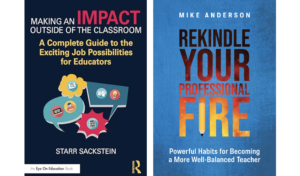Spark Passion and Purpose with Independent Research

One of the most exciting and enjoyable ways to differentiate learning for students is to lead them through a process of independent research. When students get to dig deeply into something they’re passionate about, they have the drive and stamina to engage in incredibly complex and vigorous learning. Independent research can be a fantastic way to liven up topics that might otherwise feel dry or uninspiring. Consider using it to tackle a science or social studies theme. Or, the topics might be more open-ended as you delve into nonfiction reading and writing.
In my own classrooms, I’ve seen unbelievably powerful work come out of independent research with students. Here is a small sampling:
- Robby, a fifth grader, learned about the Gallaudet school for the deaf. As a part of his presentation, he had a high school teacher and two students who were deaf join the class for an interview.
- As part of Kelly’s fifth grade research presentation of Paul Revere, she read a poem that she had written. The poem was from the perspective of Paul Revere—a lament from beyond the grave that he was known only for his midnight ride, when in fact, there was so much more to his life.
- Andrew, a fourth grader, studied ALS—the disease that was robbing him of his mother. He interviewed her doctors and had conversations with his father that helped him better understand this terrible disease.
- One year, our whole classroom was transformed as teams of students researched various ecosystems of the world and made elaborate displays on the walls, windows, and even our loft. In addition to learning about key science content as a group, students conducted mini-research projects on animals within their ecosystems that they wanted to know more about.
I recently facilitated a mini-workshop for teachers on leading independent research with elementary school students, and I’d like to share some of those ideas and resources with you!
We began by checking out a couple of examples of independent research projects that would challenge and inspire us. One shows kindergarten students’ learning celebration of a study of birds, and the other highlights a fifth grade interactive science mural of the ocean.
EL Education: Kindergartners as Experts
Eastern Elementary/Middle School: Ocean Project 2015
I then shared a planning tool that teachers could use and adapt—one which I would also like to share with you: Planning an Independent Research Unit. (I’ve shared this plan as a Word document so you can change it and adapt it. Please—make it your own!) This tool aligns with two books. Each of the major sections of the plan flow from chapters in Learning to Choose, Choosing to Learn (ASCD, 2016) and correlate with the five broad steps of using choice effectively with students: 1. creating good choices, 2. helping students choose well, 3. facilitating choice work, 4. the power of self-reflection, and 5. professional reflection. The more specific parts of the plan flow directly from the book that my friend and colleague Andy Dousis and I coauthored: The Research-Ready Classroom (Heinemann, 2006). This book provides a step-by-step guide for conducting independent research with elementary school students.
As we worked through this plan together, we paused to consider a few big ideas:
- Topic Selection: Students might be eager to pick a research topic and begin collecting information, but it’s important to help students consider topics carefully. Make sure they find a topic that is a good fit for the class theme (if there is one) and that they have the resources to study. Most importantly, make sure they’ve found a topic they really care about!
- Asking Good Questions: Learning how to ask good questions is an important and challenging skill, so this is another place to slow down. Model how to ask questions. Generate lots of different questions as a class to practice together. Confer and coach—help students individually to support them as they consider what they want to learn about their topic.
- High Quality Projects: We explored another great EL Education video (Austin’s Butterfly) to consider how peer coaching and multiple revisions can help research projects gain depth and polish.
Teachers are now going to finish plans and try their research projects with their students! We’re going to reconnect soon to support each other. At the end of the year, we’ll gather to celebrate successes and consider next steps for future student research endeavors.
As a teacher, please consider using the resources offered in this post as starting points for your own research with students. If you are a staff developer, you might try facilitating a group of energized colleagues through this process yourself. If you do, let me know how I can support your work!





Comments
Mike,
I thought of you this morning when one of my students told his k/1 buddies that we have, “A bunch of projects going on in our classroom.” I thought, Mike would be proud. I think I’m doing this teaching thing right!
That’s great, Chriss! Isn’t it fun when kids are conscious of the fun they’re having as they’re doing great work? Congratulations!